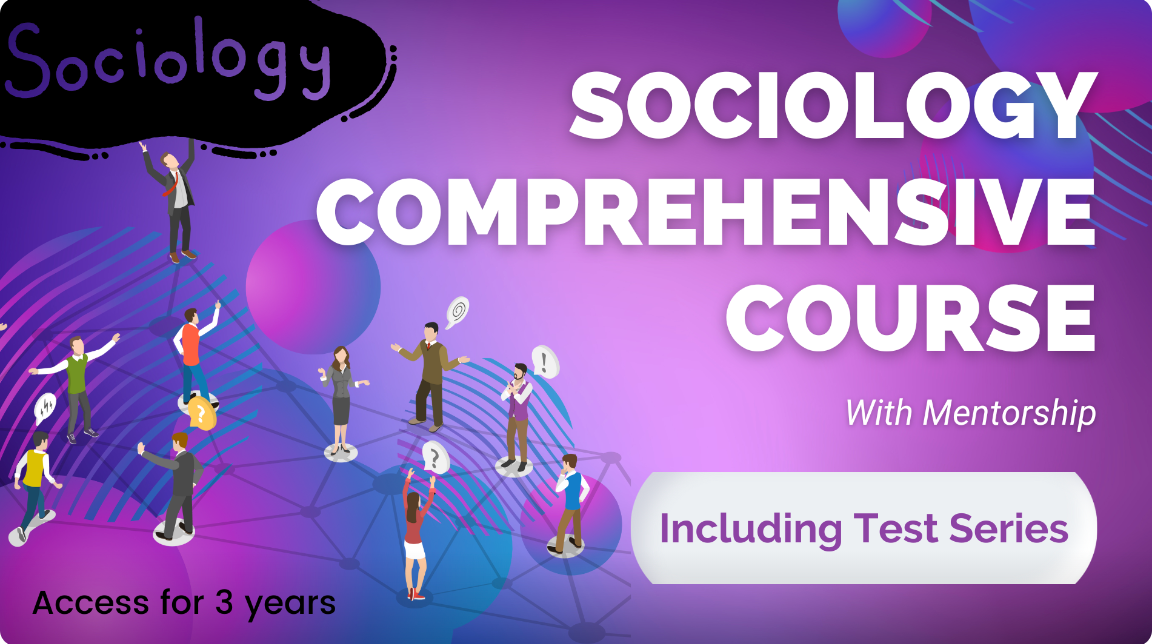Questions
- In what ways did Max Weber's analysis of the connection between religion and capitalism emphasize the role of cultural and social factors? How did he differentiate his approach from purely economic determinism? (20 Marks)
- Discuss what according to Parsons are functional prerequisites of the social system. Examine these in the context of a university as a social system. (20 Marks)
Download Model Structures PDF
Model Structures
Q1. In what ways did Max Weber's analysis of the connection between religion and capitalism emphasize the role of cultural and social factors? How did he differentiate his approach from purely economic determinism? (20 Marks)
Introduction
- Max Weber, a prominent sociologist and a key figure in the development of modern sociology, explored the relationship between religious ethics and the economy in his work, especially in his famous book "The Protestant Ethic and the Spirit of Capitalism."
- Weber's ideas revolve around the impact of religious beliefs and values on the development of modern capitalism. Let's delve into some of the key aspects of Weber's views on this relationship.
Main Body
- Protestant Ethic and Capitalism:
- In "The Protestant Ethic and the Spirit of Capitalism," Weber argued that certain religious beliefs, particularly those of Protestantism, played a significant role in the emergence and growth of modern capitalism.
- He focused on the idea of the "Protestant work ethic," which emphasized hard work, thrift, and rational economic behavior as virtues.
- According to Weber, the Protestant Reformation, particularly the teachings of John Calvin and the Calvinist movement, had a profound impact on economic attitudes.
- Calvinism promoted the notion of a "calling" or a divine duty to diligently work and succeed in one's profession as a sign of God's favor.
- This ethic encouraged individuals to accumulate wealth through hard work and frugality and to reinvest profits into their businesses for further growth. Such a mindset, according to Weber, created a conducive environment for the development of capitalism.
- The "Iron Cage" of Rationalization:
- Weber argued that the Protestant work ethic, combined with other factors, led to the rationalization of economic activities.
- Rationalization refers to the systematic and calculated organization of economic affairs for efficiency and productivity.
- As capitalism developed, it became increasingly rationalized, with economic decisions based on calculable and predictable outcomes. This "iron cage" of rationalization constrained individuals within a bureaucratic and impersonal economic system.
- Religious Ideals and Capitalist Spirit:
- Weber did not see religious ethics as a direct cause of capitalism but rather as an influential factor in shaping the cultural and psychological conditions for its development.
- He highlighted how religious ideals interacted with other historical, cultural, and economic factors to create the "capitalist spirit."
- Other Religious Traditions:
- While Weber primarily focused on Protestantism, he also acknowledged the influence of other religious traditions on economic behavior.
- For instance, he discussed how the Confucian ethics of thrift and diligence played a role in the rise of capitalism in China.
- It is essential to note that Weber's thesis has been subject to criticism and debate among scholars. Some argue that he may have overemphasized the role of religion in the development of capitalism, overlooking other crucial factors such as the role of technology, trade, and state institutions.
- Additionally, not all Protestant denominations embraced the same work ethic, and capitalist development occurred in societies with diverse religious and cultural backgrounds.
Conclusion
- While Weber’s ideas have been debated and modified over time, his work remains significant in understanding the interplay of religious beliefs, cultural values, and economic development in the evolution of capitalist societies.
Q2. Discuss what according to Parsons are functional prerequisites of the social system. Examine these in the context of a university as a social system. (20 Marks)
Introduction
- Society has certain basic necessary conditions, which must be satisfied for its survival. Such basic needs and requirements which are required for functioning of society are known as functional prerequisites.
Main Body
- Parsons' social system consists of various institutions such as family, economy, polity, etc., that have a boundary within which they maintain order.
- This self-maintenance of systems is possible because human actors as social beings are socialised in society and their motivational and value orientations accordingly are patterned.
- In order to maintain themselves, social systems have to perform adjustments in their internal organisation and external environment.
- According to Parsons, Social systems have self-adjustive and self-maintaining quality. These adjustment processes which maintain the social system internally and through its boundary conditions are called functions. There are certain functions without which a social system cannot subsist. These are called functional prerequisites by Parsons.
They are:
- Adaptation
- Goal attainment
- Integration
- Latency
Functional and their contextual application to University as a social system
- Adaptation
- Adaptation as a functional prerequisite implies generation and acquisition of resources from outside the system, its external environment and to effect its distribution in the system.
- Adaptation is oriented to factors external to the system and it has an instrumental character.
- In the context of University as a social system, this functional prerequisite involves generating resources in the form of patentable intellectual property. etc., and acquiring resources in the form of physical infrastructure, equipment to the labs, student facilities, etc.
- Goal-Attainment
- Goal-Attainment is that functional prerequisite which involves, firstly, the determination of goals,
- Then, the motivating of members of the system to attain these goals, and
- Further, the mobilising of the members and of their energies for the achievement of these goals. Its processes are consummatory in character although it does involve external interaction.
- In a University, these functions are primarily taken up by the administration board where clear goals in the form of academic results, number of research papers to be published, curriculum setting, etc. are taken up. Also, they will take note of the external happenings (outside the university) in shaping up their goals so that they are up to date with the needs of the world and preparing the students for the world.
- Integration
- Integration is that functional prerequisite which helps to maintain coherence, solidarity and coordination in the system. In the social system this function is mainly performed by culture and values. This functional prerequisite is internal to the system and is consummatory in character.
- Each University has its own unique culture and values that shape up the interactions among the members of the University leading to better integration into the University system. For example, the values and ideas of JNU are different from that of Banaras Hindu University.
- Latency
- Finally, latency is that functional prerequisite of the social system which stores, organises and maintains the motivational energy of elements in the social system. Its main functions are pattern maintenance and tension management within the system. This function is performed by the socialisation process of the members of the social system.
- The process of socialisation helps in internalisation of the symbols, values, tastes and habits specific to the social system in the personality of the actors who are members of the system. It needs also to be added that in Parsons' view, the function of tension management must take place internally in all institutions.
- This latency function is done in a University with the help of formation of student's union in a democratic setup, interactions between the administration and students, solving the problems through discussions and debates, and ensuring that opinions of all students are heard.

